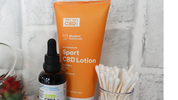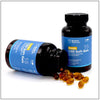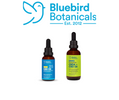How Can We Help the Bees?

Coronavirus, the U.S. government confirming UFOs, and now murder hornets? It’s safe to say 2020 is off to an...err...eventful start.
It’s the last of the three - the murder hornets - that brings us to our topic for today’s discussion: bees.
We already know that increasing temperatures and precipitation linked to climate change have begun to wreak havoc on the bee populations, with the likelihood of a bumblebee population being able to survive living in a single location declining by “an average of 30% within one human generation,” according to University of Ottawa researchers. Now, Asian giant hornets, lovingly referred to as “murder hornets,” have started showing up in the U.S. and could spell trouble for bee populations. Todd Murray, WSU Extension entomologist and invasive species specialist, noted that these hornets are a "health hazard, and more importantly, a significant predator of honey bees."
Challenges aside, hemp has been touted as a potential solution to the declining honeybee population. And hemp plants can definitely play a role in helping prevent further decline of the bee population. However, they’re not a slam-dunk solution and we’ll need to do more than just plant a lot of hemp.
Here’s why.
Hemp and the bees
There have been several studies that have sought to determine if hemp crops can, in fact, have a positive effect on honey bees.
One such study published Another study by Colorado State University purported that an increase in hemp production could directly increase the bee populates because cannabis is pollen-rich. This study noted that, “when other crops are not available, bees can pollinate hemp.” Further drawing out that, “Ultimately, pollination is the process that makes food production possible.”
However, another study published at Colorado Hemp Honey paints a bit more complex picture. The initial aim of this study was to see if hemp could “provide bees with additional forage to help fortify their honey reserves for winter,” but its findings were not so encouraging. While the hemp plants did attract the bees and may have showed early promise, by the end of August, all 12 hives involved in the study were not producing enough honey. Despite remediation attempts made to encourage additional production of honey, only six hives in the experiment ended with enough honey in the hive to have a chance to survive the upcoming winter.
This study ultimately concluded that, “Cannabis, although rich in pollen, is naturally nectar deficient and since bees need an abundance of nectar to produce honey they will be forced look in other places to find it.”
That’s not to say that hemp isn’t capable of helping bee populations. A recent study published in Environmental Etymology showed an increase in the species diversity and populations in a hemp-growth area in New York. This study also noted that hemp does produce an “abundance of pollen during a period of floral dearth in agricultural landscapes.” This could be beneficial for bee populations who have access to other flowering plants outside of the hemp growing season.
That’s the seems to be the [bee]line we’re with dancing around with hemp and bees - hemp plants can help, but can’t alone stimulate growth in honey production.
What Else Can We Do?
Part of the issue with the declining honey bee population is the reduction in suitable habitat and, by extension, access to food. Wildflowers no longer bloom abundantly over the landscape, due in part to chemicals and in-part to development and urbanization.
A small but impactful thing we each can do as individuals (for those who have a suitable location), is start a pollinator flower garden. You can do this from a box on a balcony or plant directly into your yard or garden bed. Be sure to choose native species for your yard to ensure they’re best adapted to your climate. Consider allowing weeds like dandelions grow wild in your yard, as these can be great sources of pollen for bees. You could also place a small water basin to give the bees a drink. Make sure to include a few stones and floating cork on the water so bees don’t drown. You can also try foregoing pesticides and chemicals on your lawn, if you’ve tended to use them.
Have other ideas for how we can support our bees? Connect with us on Facebook, Twitter, and Instagram.









